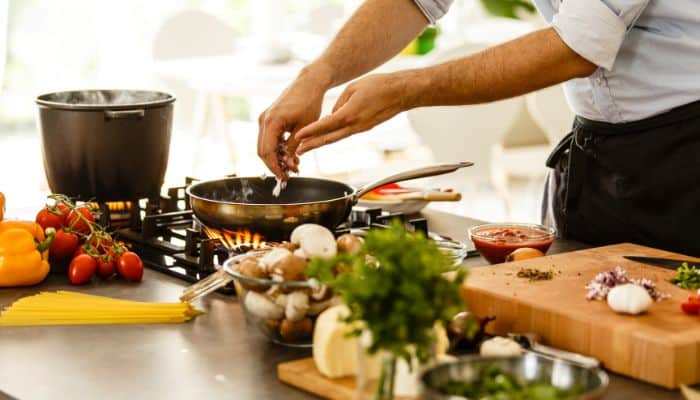The 8 Cardinal Sins of Cooking
Everyone learns to cook at their own pace. Exploring new recipes is a great way to gain confidence, but it’s also how many people learn to make meals incorrectly.
Whether you’re a professional chef or a home cook, it’s best never to commit these cardinal sins of cooking. You’ll save yourself plenty of time and headaches by avoiding these major mistakes.
1. Not Washing Your Rice
Rice comes in a sturdy box, so why bother washing it? The packaging may not even include that step in its directions. It might seem like too much work, but rinsing your rice in a fine mesh strainer reduces the pesticides lingering on each grain.
You’ll also wash off loose starch, which makes the water runoff cloudy. You can cook it after rinsing for a minute or when the water runoff becomes clear again.
2. Never Sharpening Your Knives
Every time you use a knife to cut roast beef or slice cheese, the fine blade loses its edge. If you never sharpen your knives, you’ll notice yourself working harder to cut even soft ingredients. Look into getting a sharpener or a knife block with one built in. Running your blade against the sharpener’s edge cuts the steel into a fine point that can tackle any recipe.
You’re likely wondering how often you should sharpen your knives, but there’s no singular answer. It depends on how much you use them. Someone who slices ingredients daily will have duller knives than someone who eats primarily boxed meals. Pay attention to how easily you can cut dense ingredients like uncooked meats and sharpen your blades when you feel like you’re struggling.
3. Pouring Grease Down the Drain
When you finish cooking ground beef, it’s all too tempting to pour the grease down the kitchen sink with hot running water. Even if that’s how you’ve always drained your ground meat, avoid doing it again.
Fats have long hydrocarbon chains that become solid at room temperature, even if there’s running water rushing over them. They’ll cling to your pipes and become permanent clogs that require professional removal. It’s much better to drain the grease into an old spaghetti sauce jar and chuck it in the garbage when the jar’s full.
4. Tasting Food With Your Fingers
It’s always a good idea to sample what you’re making to ensure you’re on the right track. Unless you’re cooking for yourself, grab a small spoon instead of using your finger. You won’t contaminate your food with whatever bacteria is on your hand. You’ll also reduce your risk of burning yourself if your food’s hotter than expected.
5. Using Preshredded Cheese
Choosing between a block of cheese and shredded cheddar for your next macaroni and cheese night might seem easy. You only have to dump the shredded variety in some milk to make your sauce. Easy enough. The only issue is the anti-caking agent on each tiny shred.
Cheese manufacturers apply anti-caking powders made with various starches to keep the individual pieces from congealing in the packaging. Although that’s helpful if you’re using it to top your salad, cheese sauces require blended ingredients. Use a grater to shred a solid block of your favorite variety so it melts perfectly with your smoky seasonings, garlic powder and other preferred spices.
6. Adding Salt Before Tasting Your Food
Salt makes nearly any recipe better. It deepens cheesy recipes and enhances tomato-based sauces. It’s also likely already in some of your ingredients. Check those premade seasoning packets and other groceries for added sodium.
If you sprinkle salt into your recipes before tasting your food, you may end up with a meal that’s too salty to eat. Just remember to use a spoon for sampling!
7. Cooking Your Pasta Too Long
Check your pasta’s instructions when you’re ready for spaghetti and meatballs. You might not think boiling it for too long will affect your meal, but it all comes down to your blood sugar.
Cooking your pasta too long increases the glycemic response in people sensitive to blood sugar spikes. When food doesn’t raise your blood sugar, your body takes a bit more time to digest it. You’ll feel full longer by cooking your pasta to al dente perfection according to the instructions on its packaging.
8. Not Letting Your Meat Set
Imagine grilling the perfect steak. You place it on a large plate to bring it inside, but don’t cut it right away. Letting it sit in its own juices allows the meat to reabsorb the flavorful fats it’s losing due to the cooking process. Give it a few minutes and you’ll get a juicier dinner. If you’re worried about your meat getting cold, set your oven to its warming mode so your food stays warm without continuing to cook.
Improve Your Cooking Skills
If you avoid these cardinal sins of cooking, you’ll do just fine in the kitchen. Take care of your knives, be careful with your ingredients and keep an open mind. Life is all about learning, and preparing food provides lots of opportunities for that. You’ll continue improving in the kitchen and enjoy even more delicious meals if you’re always ready to try something new.


